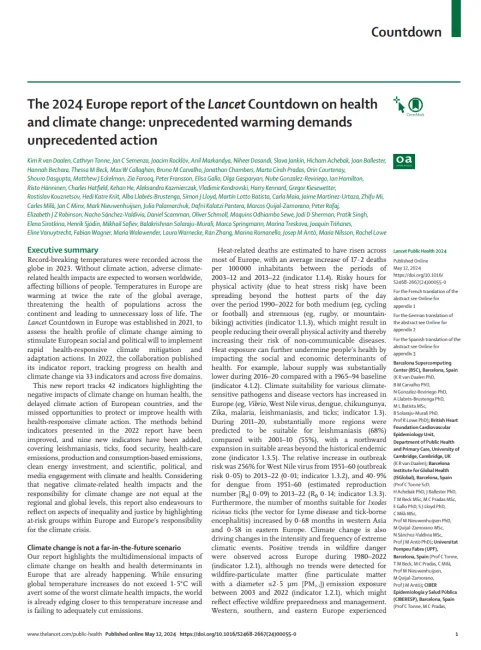This report is part of the Lancet Countdown in Europe, which is an on-going effort to assess the health impacts of climate change in Europe to reinvigorate social and political will for urgent climate mitigation and adaptation actions. The initial report, in 2022, tracked 33 indicators across five domains. This report tracks 42 indicators related to the impacts of climate change to human health, the response of European countries and the opportunities to better health and climate action attuned to health issues. It finds that whilst scientific and the corporate sector are increasingly engaging with these issues, the media, the political sector and individuals have low levels of engagement with the interplay between health and climate change in Europe. The report notes that significant political and public support is needed to stimulate further action

Summary
This report is part of the Lancet Countdown in Europe, which is an on-going effort to assess the health impacts of climate change in Europe to reinvigorate social and political will for urgent climate mitigation and adaptation actions. The initial report, in 2022, tracked 33 indicators across five domains. This report tracks 42 indicators related to the impacts of climate change to human health, the response of European countries and the opportunities to better health and climate action attuned to health issues.
New indicators cover: leishmaniasis, ticks, food security, health-care emissions, production and consumption-based emissions, clean energy investment, and scientific, political, and media engagement with climate and health.
The report updates statistics related to the worsening impact of climate change in Europe across multiple areas including heat-related deaths (Figure 1), climate suitability for various climate-sensitive pathogens and disease vectors (eg, Vibrio, West Nile virus, dengue, chikungunya, Zika, malaria, leishmaniasis, and ticks, changes in the intensity and frequency of extreme climatic events such as substantial increases in extreme drought conditions and almost 12 million additional people affected by moderate or severe food insecurity.
The report also elaborates on social inequality issues related to the health impacts of climate change. The report notes that these impacts are often worse in communities of people who are the least responsible. It also notes geographic variety in impacts - for example Southern Europe tends to suffer from problems such as heat-related illnesses, wildfires, food insecurity, drought and leishmaniasis whilst Northern European countries face worse impacts from Vibrio and ticks. Climate related health impacts are also substantially more pronounced in specific demographic groups including ethnic minorities, Indigenous peoples, low-income communities, migrants and displaced people, sexual and gender minority populations and women experiencing pregnancy and childbirth.
The report also tracks the extent to which different sectors are engaging with climate change and health. Engagement is determined for each sector (academia, media, corporate, political and European citizens (or individuals). Engagement is monitored by assessing the number of academic publications on climate change and health, citizen and public engagement on X (formerly Twitter), media publications by geographic region, the use of health and climate change language in political speeches and corporate reports. It finds that whilst scientific and the corporate sector are increasingly engaging with these issues, the media, the political sector and individuals have low levels of engagement with the interplay between health and climate change in Europe. The report notes that significant political and public support is needed to stimulate further action.
Reference
van Daalen, K.R., et al. 2024. The 2024 Europe report of the Lancet Countdown on health and climate change: unprecedented warming demands unprecedented action. The Lancet Public Health 0.
Read more here. See also the TABLE explainer How are food systems, diets, and health connected?




Comments (0)